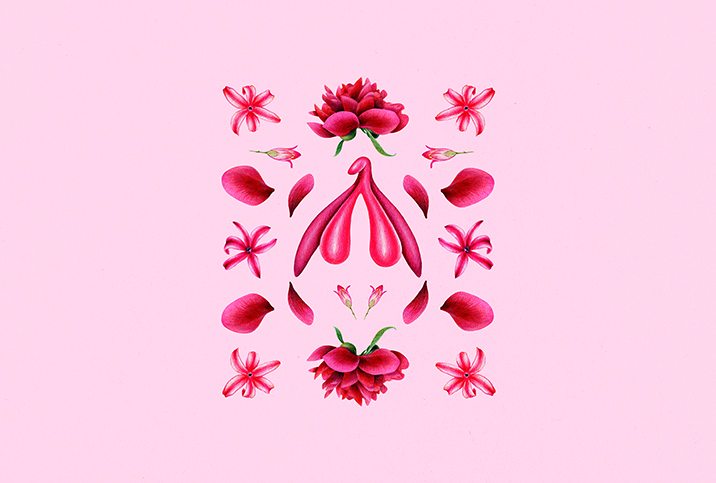The Benefits of Counting Your Orgasms

If you're a cisgender, heterosexual woman who sleeps with men, chances are good you are personally impacted by the pleasure gap. Much like the wage gap, the pleasure gap represents a discrepancy between women and men, this one being the number of orgasms cis-het women experience during sex compared with male partners.
It's a fairly significant discrepancy. A study published in 2017 in the Archives of Sexual Behavior surveyed more than 52,500 U.S. adults of varied sexual orientations and found 95 percent of straight men reported they usually or always orgasm during sex, compared with 65 percent of straight women.
Similarly, the National Survey of Sexual Health and Behavior has shown women report less satisfaction with sexual activity than men, with less pleasure, less arousal and fewer orgasms.
This gap is at least partially related to cis-het couples typically having penis-in-vagina intercourse, and most women do not orgasm from this act alone, according to Marla Renee Stewart, M.A., a sexologist and sexual strategist at Velvet Lips Sex Ed in Atlanta.
Carlen Costa, a Toronto-based clinical sexologist, psychotherapist and founder of the Everyday Goddess, a life design community, wants to close this gap once and for all by encouraging folks to count their orgasms. With a goal of empowering 1 million orgasms worldwide, Costa created the One Million Orgasms Movement in June 2021, along with an online counter where people can "own their orgasm" by reporting each time they climax through the act of self-pleasure.
"I created the counter as a form of radical advocacy to normalize women's experience of pleasure, to create a safe space for pleasure-based dialogue and education, as well as to close the orgasm gap and address sociocultural and psychosocial factors that create barriers to pleasure for women all over the world," she explained.
It's a conversation starter
Costa said encouraging people, especially women, to count their orgasms helps to build safe and sex-positive narratives, enabling healthy conversations about pleasure, sexual health and the power of self-love.
The counter is a conversation starter, and Costa said people are known to respond well to numbers and statistics. It normalizes talking openly about something long considered shameful and takes the focus away from men's pleasure, which Costa said has long been at the forefront of not only our intimate relationships but also our economy, sociocultural communities and even medical research.
"The One Million Orgasms Movement is about reframing and taking back the narrative about pleasure, not from the sexualized lens of the male gaze and patriarchy, but from the place of womanhood, of femininity, of taking back our bodies and celebrating them and their potentials and all of the things that we do, not just to be of service to others and not just to create life," Costa said.
Women are socialized to be givers, to please others often at the cost of their own pleasure. Costa said the approach of her movement dares women to think about their own needs and how they're investing in themselves. If women are people-pleasers, then Costa said the movement is a "people-pleaser counter-tool."
Impacts beyond the bedroom
The counter is a way for women to reclaim their pleasure, and Costa said the hope is that reclamation can ultimately have positive impacts on everything from stigmas surrounding women's sexuality to the pink tax on women's products to unsafe work conditions for sex workers.
If women are more in touch with their wants and needs, Costa hopes this will give them the confidence to push back when such needs are being ignored, like when their male gynecologist dismisses their pain.
Stewart agreed, saying she believes when we prioritize women's pleasure, our everyday lives can improve in a multitude of ways.
While Stewart believes we should strive to close the orgasm gap, she said fixating on orgasms and only the orgasm can have a negative impact on people who may experience performance anxiety or frustration if the goal is not achieved. Ultimately, she said, it's about experiencing pleasure and enjoying the ride.
'It isn't about reaching a million orgasms, it's about the narrative of our pleasure and how we all deserve to feel good for ourselves first.'
"I think we should all strive towards orgasms because they are an incredible feeling, and I also think you are the one responsible for that orgasm," she said. "But I think if you are the type of person that gets caught up in that pressure, then you should just strive to have fun and relieve yourself of any pressure that might get your anxiety revved up."
Though the pleasure gap refers specifically to cis-het women, Costa said she wants this movement to be for all people, including trans and nonbinary folks as well as cis-het men. That's because men are highly socialized to not know about the actual experience of pleasure but rather the action of it, which she said also does a disservice to them and their deepest needs.
The orgasm counter got off to a slow start, but Costa said she plans to speak about the movement at upcoming international events, including in the United Kingdom and Norway, and hopes this will give it a boost.
At the end of the day, however, Costa's real mission has nothing to do with the number on her website and everything to do with how we approach the subject of women's pleasure in our conversations and personal lives going forward.
"I hope it gets to a million, but even just having this conversation is already proving the point of what it is about," she said. "It isn't about reaching a million orgasms, it's about the narrative of our pleasure and how we all deserve to feel good for ourselves first."


















